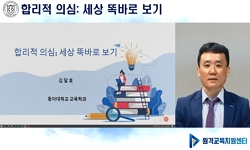This study investigated if presenting problems only to the learner is more effective instructional procedure than the matched worked example and problem for the learners who already formed partial schema of the target cognitive skill. It also investig...
http://chineseinput.net/에서 pinyin(병음)방식으로 중국어를 변환할 수 있습니다.
변환된 중국어를 복사하여 사용하시면 됩니다.
- 中文 을 입력하시려면 zhongwen을 입력하시고 space를누르시면됩니다.
- 北京 을 입력하시려면 beijing을 입력하시고 space를 누르시면 됩니다.

멀티미디어 학습 환경에서 연습문제의 유형이 인지적 기능의 획득에 미치는 효과 = Effect of practice problem format on cognitive skill acquisition in multimedia-based instruction
한글로보기https://www.riss.kr/link?id=A101959611
- 저자
- 발행기관
- 학술지명
- 권호사항
-
발행연도
2005
-
작성언어
-
- 주제어
-
KDC
300
-
등재정보
KCI등재
-
자료형태
학술저널
- 발행기관 URL
-
수록면
33-52(20쪽)
-
KCI 피인용횟수
2
- 제공처
- 소장기관
-
0
상세조회 -
0
다운로드
부가정보
다국어 초록 (Multilingual Abstract)
This study investigated if presenting problems only to the learner is more effective instructional procedure than the matched worked example and problem for the learners who already formed partial schema of the target cognitive skill. It also investigated if the results of two practice conditions is related to the achievement level of learners at practice phase. An experiment was implemented on 68 third grade elementary school students. Participants were randomly assigned either to problems only condition, to matched worked example and problem condition, or to reduced number of problems only condition. Participants studied a topic on mathematics in a multimedia based instruction. Learners` study time, their response correctness to the practice problems, and achievement level after the treatment were measured. Results revealed that problems only is more effective as a practice condition than the matched worked example and problem condition for the learners. The results of different practice conditions were related to the level of each student`s response correctness to the practice problems. The results also tell us that the effect of practice conditions depends on the number of practice problems learners actually have to try to solve for themselves. The results of this study suggest that it is a better instructional procedure to present enough numbers of problems only to the learners at practice phase than the matched worked examples and problems when learners already formed partial schema of the target cognitive skill. The results also suggest that learners` response correctness level is a variable that mediates the effect of different instructional treatments employed in this study.
참고문헌 (Reference)
1 오선화, "하이퍼텍스트 학습환경에서 학습전략, 메타인지, 작동기억이 성취도에 미치는 영향" 10 (10): 35-63, 2004
2 진화봉, "언어정보와 시각정보의 통합과정에 관여하는 작동기억 기제" 19 (19): 51-75, 2003
3 차영준, "비모수 검정" 自由 아카데미 2001
4 이현정, "멀티미디어 학습환경에서 학습자 특성별 인지부하 효과" 21 (21): 79-102, 2005
5 진화봉, "멀티미디어 학습 환경에서 통합촉진 전략이 인지부하에 미치는 효과" 19 (19): 139-160, 2003
6 오선아, "멀티미디어 보조학습에서 정보제시유형이 작동기억 부하에 미치는 효과" 9 (9): 71-99, 2003
7 Chandler, "When problem solving is superior to studying worked examples Journal of Educational Psychology" 93 : 579-588, 2001
8 Owen, "What do students learn while solving mathematics problems Journal of Educational Psychology" 272-284, 1985
9 Carroll,W.M, "Using worked examples as an instructional support in the algebra classroom" 86 : 360-367, 1994
10 Atkinson, "Transitioning from studying examples to solving problems Combining fading with prompting fosters learning Journal of Educational Psychology" 95 : 774-783, 2003
1 오선화, "하이퍼텍스트 학습환경에서 학습전략, 메타인지, 작동기억이 성취도에 미치는 영향" 10 (10): 35-63, 2004
2 진화봉, "언어정보와 시각정보의 통합과정에 관여하는 작동기억 기제" 19 (19): 51-75, 2003
3 차영준, "비모수 검정" 自由 아카데미 2001
4 이현정, "멀티미디어 학습환경에서 학습자 특성별 인지부하 효과" 21 (21): 79-102, 2005
5 진화봉, "멀티미디어 학습 환경에서 통합촉진 전략이 인지부하에 미치는 효과" 19 (19): 139-160, 2003
6 오선아, "멀티미디어 보조학습에서 정보제시유형이 작동기억 부하에 미치는 효과" 9 (9): 71-99, 2003
7 Chandler, "When problem solving is superior to studying worked examples Journal of Educational Psychology" 93 : 579-588, 2001
8 Owen, "What do students learn while solving mathematics problems Journal of Educational Psychology" 272-284, 1985
9 Carroll,W.M, "Using worked examples as an instructional support in the algebra classroom" 86 : 360-367, 1994
10 Atkinson, "Transitioning from studying examples to solving problems Combining fading with prompting fosters learning Journal of Educational Psychology" 95 : 774-783, 2003
11 Paas,F, "Training strategies for attaining transfer of problem solving skill in statistics:A cognitive load approach" 84 : 429-434, 1992
12 & Cooper, "The use of worked examples as a substitute for problem solving in learning algebra" 59-89, 1985
13 Anderson, "The role of examples and rules in the acquisition of a cognitive skill Journal of Experimental Psychology" Fincham 23 : 932-945, 1997
14 Clarke, "The impact of sequencing and prior knowledge on learning mathematics through spreadsheet Applications" 53 (53): 15-24, 2005
15 Ayres, "The expertise reversal effect" 38 : 23-31, 2003
16 Trafton, "The contributions of studying examples and solving problems to skill acquisition Proceedings of the Fifteenth Annual Conference of the Cognitive Science Society" 1993
17 A, "Structuring the transition from example study to problem solving in cognitive skills acquisition" 38 : 15-22, 2003
18 Yeung, "Split-attention and redundancy effects in reading with explanatory notes" 23 : 1-21, 1998
19 Quilici, "Role of examples in how students learn to categorize statistics word problems Journal of Educational Psychology" 88 : 144-161, 1996
20 Mayer, "Nine ways to reduce cognitive load in multimedia learning" 38 (38): 43-52, 2003
21 Mayer,R.E, "Multimedia learning" Cambridge University Press 2001
22 Chandler, "Levels of expertise and instructional design" 1-17, 1998
23 Mwangi, W., & Sweller, J., "Learning to solve compare word problems The effect of example format and generating self-explanations" 16 : 173-199, 1998
24 Zhu, "Learning mathematics from examples and by doing" 137-166, 1987
25 Renkl,A, "Learning from worked-out examples:A study on individual differences" 21 : 1-29, 1997
26 Atkinson, "Learning from examples Instructional principles from the worked examples research Review of Educational Research" 70 : 181-214, 2000
27 Mayer, R. E, "Learning and Instruction" Prentice-Hall 2003
28 Chandler, "Learner experience and efficiency of instructional guidance" 21 : 5-23, 2001
29 Van Merrienboer, "Instructional strategies and tactics for the design of introductory computer programming courses in high school" 252-285, 1987
30 Chandler, "Incorporating learner experience into the design of multimedia instruction Journal of Educational Psychology" 92 : 126-136, 2000
31 Chi, "How student study and use examples in learning to solve problems" 1989
32 "Guidance during mathematical problem solving Journal of Educational Psychology" 424-436, 1988
33 A, "From studying examples to solving problems Proceeding of the 22nd Annual Conference of the Cognitive Science Society" 393-398, 2000
34 A, "From example study to problem solving Journal of Experimental Education" 70 : 293-315, 2002
35 Tuovinen, J., & Paas, F, "Exploring Multidimensional Approaches to the Efficiency of Instructional Conditions" 32 : 133-152, 2004
36 & Levine, "Effects of sub-goal density on means-ends analysis and learning Journal of Experimental Psychology" 463-474, 1982
37 Cooper, "Effects of schema acquisition and rule automation on mathematical problem-solving transfer Journal of Educational Psychology" 347-362, 1987
38 Chandler, "Cogntive load and selective attention as factors in the structuring of technical material Jouranl of Experimental Psychology" 176-192, 1990
39 VanLehn,K, "Cognitive skill acquisition" 47 : 513-539, 1996
40 A, "Cognitive load theory and instructional design: recent developments" 38 (38): 1-4, 2003
41 Anderson,J.R, "Acquisition of cognitive skill" 89 : 369-403, 1982
42 Mayer, "A split-attention effect in multimedia learning Evidence for dual-processing systems in working memory Journal of Educational Psychology" 90 : 312-320, 1998
43 Tuoviane, J., & Sweller, J, "A comparison of cognitive load associated with discovery learning and worked examples Journal of Educational Psychology" 91 : 334-341, 1999
동일학술지(권/호) 다른 논문
-
교육용 온라인 게임에서 몰입과 게임행동의도에 영향을 미치는 주요 요인에 대한 연구
- 한국교육공학회
- 백영균 ( Youngkyun Baek )
- 2005
- KCI등재
-
온라인 수업에서 자기조절학습과 협동학습의 관계 및 이들이 인지적 참여수준에 미치는 영향에 대한 경로분석
- 한국교육공학회
- 이의길 ( Euikil Lee )
- 2005
- KCI등재
-
웹기반 팀학습 환경에서 공유정신모형이 과제수행에 미치는 영향
- 한국교육공학회
- 이영민 ( Youngmin Lee )
- 2005
- KCI등재
-
- 한국교육공학회
- 장정아 ( Jung A Chang )
- 2005
- KCI등재
분석정보
인용정보 인용지수 설명보기
학술지 이력
| 연월일 | 이력구분 | 이력상세 | 등재구분 |
|---|---|---|---|
| 2027 | 평가예정 | 재인증평가 신청대상 (재인증) | |
| 2021-01-01 | 평가 | 등재학술지 유지 (재인증) |  |
| 2018-01-01 | 평가 | 등재학술지 유지 (등재유지) |  |
| 2015-01-01 | 평가 | 등재학술지 유지 (등재유지) |  |
| 2011-01-01 | 평가 | 등재학술지 유지 (등재유지) |  |
| 2009-01-01 | 평가 | 등재학술지 유지 (등재유지) |  |
| 2007-01-01 | 평가 | 등재학술지 유지 (등재유지) |  |
| 2004-01-01 | 평가 | 등재학술지 선정 (등재후보2차) |  |
| 2003-01-01 | 평가 | 등재후보 1차 PASS (등재후보1차) |  |
| 2002-01-01 | 평가 | 등재후보 1차 FAIL (등재후보1차) |  |
| 1999-07-01 | 평가 | 등재후보학술지 선정 (신규평가) |  |
학술지 인용정보
| 기준연도 | WOS-KCI 통합IF(2년) | KCIF(2년) | KCIF(3년) |
|---|---|---|---|
| 2016 | 3.7 | 3.7 | 3.26 |
| KCIF(4년) | KCIF(5년) | 중심성지수(3년) | 즉시성지수 |
| 2.89 | 2.68 | 3.751 | 0.75 |




 RISS
RISS KISS
KISS







